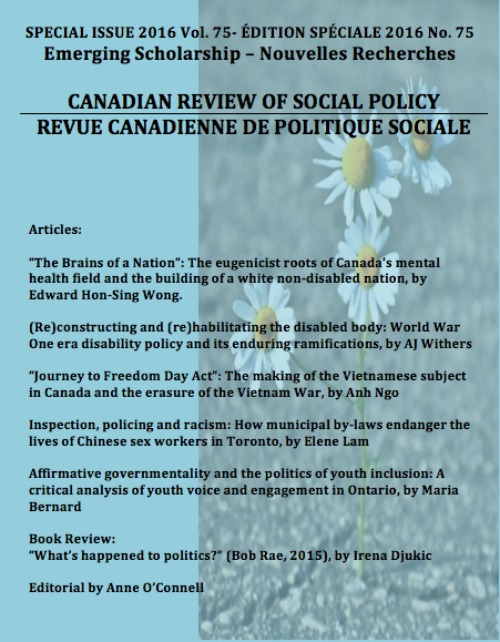Affirmative governmentality and the politics of youth inclusion: A critical analysis of youth voice and engagement in dominant political discourse in Ontario
Keywords:
Youth inclusion and participation, affirmative governmentality, youth policiesAbstract
While a robust literature tracks the ways in which racialized youth are excluded from dominant spaces, this article examines the effects of policies and programs that invite them in. The growing interest in youth inclusion and participation can be linked to key global influences such as the increasing shift towards asset-based and Positive Youth Development (PYD) models, that currently influences government policy and funding strategies in Canada and other countries. Using Foucault’s governmentality framework, I engage in a brief examination of Ontario’s document, Stepping Up: A Strategic Framework to Help Ontario’s Youth Succeed (2013), to understand how youth inclusion, participation, and civic engagement are imagined. This article seeks to disturb current constructs of marginalized youth voice and inclusion within dominant discourse in Canada and argues that these discourses function as a form of affirmative governmentality. I discuss the conditions of meaningful youth inclusion and participation, which requires questioning normative constructs of youth, acknowledging the structural oppressions experienced by young people, and working with youth to understand their own notions of participation.
La gouvernementalité positive et les politiques d'inclusion des jeunes: Une analyse critique de la voix et l'engagement politique des jeunes dans le discours politique dominant en Ontario.
Résumé
Bien qu'il existe déjà beaucoup de données sur les manières dont les jeunes racialisés sont exclus des espaces dominants, cet article se penche sur les effets des politiques et programmes qui veulent les inclure. L'intérêt croissant pour la participation et l'inclusion des jeunes est peut-être lié à des influences globales majeures, comme le virement vers des modèles tels le développement fondé sur les acquis et le développement positif des jeunes, qui présentement à beaucoup d'influence sur les politiques et le financement gouvernemental au Canada et ailleurs. Utilisant le concept de gouvernementalité de Foucault, j'examine le document de l'Ontario Stepping Up: A Strategic Framework to Help Ontario’s Youth Succeed (2013), afin de comprendre comment l'inclusion, la participation, et l'engagement civique des jeunes, sont imaginés. Cet article veut troubler les constructions courantes de la voix et de l'inclusion des jeunes marginalisés dans les discours dominants au Canada. Je propose que ces discours servent en tant que gouvernementalité positive. Je discute des conditions qui créent une inclusion et une participation véritables des jeunes, ce qui exige questionner les constructions normative de la jeunesse, tout en reconnaissant que les oppressions structurelles auxquelles les jeunes font face, et travailler a comprendre leurs propres notions de participation.
Mots clefs: participation et inclusion des jeunes; gouvernementalité; politiques des jeunes
Downloads
Published
How to Cite
Issue
Section
License
1-The author guarantees that the manuscript is an original work not published elsewhere in print or electronically in whole or in part, except in abstract form, that the author has the full power to make this contribution, and that the manuscript contains no matter libelous or otherwise unlawful or which invades the right of privacy or which infringes any proprietary right.
2-The author guarantees that the manuscript has not been previously published in print or electronically and that if the manuscript contains any tables, figures or images fully reproduced or closely adapted from previously published material, the author must obtain the necessary permission from the author/publisher holding the original copyright prior to publication in CRSP. The author may be required to produce evidence of permission granted to CRSP’s editors.
3-As a condition of publication in CRSP, the author assigns all copyright to CRSP, including but not limited to the right to publish, republish, and otherwise distribute this manuscript in print, electronic, or other formats. As CRSP is a non-profit interdisciplinary scholarly journal, the author will receive no royalty or other monetary compensation for the assignment set forth in this agreement.
For the purpose of full disclosure, CRSP will not normally use the content provided by the author in a commercial venture, but for the purpose of disseminating the author’s content to as many readers as possible. For distribution, third parties engaging in commercial activities may be contracted to distribute the content globally, and such parties may make a profit out of the author’s content in their normal course of business. CRSP will not pay the author or reimburse the author in any form based on such commercial activities because the conduct of such commercial activities is outside the control of CRSP.
Any future reference to or use of this published material by the authors must acknowledge CRSP as the original place of publication.
PERMISSION REQUEST/ARCHIVING
Permission is given to author(s) receiving funding via Tri-Council Agencies, the Canadian Institutes of Health Research (CIHR), the Natural Sciences and Engineering Research Council of Canada (NSERC) and the Social Sciences and Humanities Research Council (SSHRC), to make their publications freely available in an Open Access repository within the stated deadline by the Tri-Council Agencies (12 months following publication). Archiving of publication must be a manuscript copy bearing none of the CRSP headers, footers or any other distinguishing marks. No links to the article on the CRSP website is permitted.
Permission requests from third parties to reproduce articles in part or full in academic/educational publications can be directed to the managing editor of CRSP, and will not be unreasonably denied.

